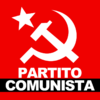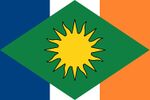1736 Vegno Elections
| |||||||||||||||||||||||||||||||||||||||||||||||
| |||||||||||||||||||||||||||||||||||||||||||||||
| Turnout: (% of entitled) | |||||||||||||||||||||||||||||||||||||||||||||||
The 1736 AN Vegno Elections were the eighth ever general elections of the Republic of Vegno and saw the election of the President of the Republic of Vegno and the composition of the Parliament, the Assemblea Nazionale.
The Parliament met for the first session of the fourth legislature on early 1737 AN. Following the constitutional reform approved in 1708 by the Mancuso I Cabinet, each legislature will last five years. As the General Election of Vegno, population voted both for the President of the Republic, with the two most voted candidates accessing the final ballot a week after, and for the composition of the Parliament, which reflected the formation of the new government.
Voting system
The electoral law in force is the "Rinaldellum bis", replacing the electoral law of 1708 AN and provides for a mixed electoral system, where:
- 66,66% of the seats (100 of 150 in the Assemblea Nazionale) are assigned through the proportional system in multi-member constituencies on the basis of blocked lists; the allocation of seats is carried out at regional levels.
- 33,33% of the seats (50 of 150 in the Assemblea Nazionale) are assigned with a single-round majority system (1 seat for the most voted party in each single circumscription.
In accordance with the Constitution, modified by the Mancuso I Cabinet 150 deputies are elected. Furthermore, the composition of the parliament and the mandate of President of the Republic will now last for five years instead of three.
The voting paper, which is a single one for the majority and the proportional systems, shows the names of the candidates to single-member constituencies and in close conjunction with them the symbols of the linked lists for the proportional part, each one with a list of the relative candidates. The voter is able to cast their vote in three different ways, among them:
- Drawing a sign on the symbol of a list. In this case, the vote extends to the candidate in the single-member constituency that is supported by that list.
- Drawing a sign on the name of the candidate of the single-member constituency and another one on the symbol of one list that supports them; the result is the same as that described above. Under penalty of annullment, the panachage is not allowed, so the voter cannot vote simultaneously for a candidate in the uninominal constituency and for a list which is not linked to them.
- Drawing a sign only on the name of the candidate for the uninominal constituency, without indicating any list. In this case, the vote is valid for the candidate in the single-member constituency and also automatically extended to the list that supports them; however, if that candidate is connected to several lists, the vote is divided proportionally between them, based on the votes that each one has obtained in that constituency.
Background
The government formed following the latest political elections of 1731 achieved a decent level of support, despite the already announced departure of Luca Zarrella, the leader of Forza Vegno, who served twice as President of the Republic and twice as Prime Minister. This first experience of a center-right-led government focused on a liberal and conservative approach, which was well-received by the majority of the population, despite strong obstructionism from the radical opposition led by Tito Bettella's Communists.
While the government's political actions were welcomed by the public, its handling of the numerous protests by Communists and popular unions was not well-received by voters. This led to an intense and contentious electoral campaign, as well as heated final months in office, highlighting the growing polarization between the right and left factions.
Electoral campaign
Electoral Lists and Candidates
| Alliance | Lists | Head of Party | Seats at last election | Coalition leader | ||
|---|---|---|---|---|---|---|
| Centre-right coalition | Forza Vegno (FV) | TBD | 27 | Orazio Torlo-Marani | ||
| Partito Popolare Vegnese (PPV) | Luigi Pandolfi | 4 | ||||
| Nazarene Movement (NM) | Orazio Torlo-Marani | 48 | ||||
| Left coalition | Vegno Vivo (VV) | Haldi Rinaldi | 8 | TBD | ||
| Partito Comunista (PC) | Tito Bettella | 26 | ||||
| Partito Democratico Costituzionale (PDC) | Antonio Visciglia | 17 | ||||
| Partito Nazionalista Vegnese (PNV) | Mickey Lange Levati | 14 | - | |||
| I Verdi - Peppe Freeda (PF) | Peppe Freeda | 6 | - | |||
| Partito Indipendentista Vegnese (PIV) | Lewis Newhouse | - | - | |||
| Swnndyrrr Party (PS) | Rinne Baarrnan | - | - | |||
Parliament Results
Overall Results
Circumscription results
| Circumpscription | Centre-right coalition | Left coalition | Unlinked lists | ||||||||
|---|---|---|---|---|---|---|---|---|---|---|---|
| FV | PPV | NM | VV | PC | PDC | PNV | PF | Others | |||
| Cossa 1 | - | ||||||||||
| Cossa 2 | - | ||||||||||
| Cossa 3 | - | ||||||||||
| Cossa 4 | - | ||||||||||
| Cossa 5 | - | ||||||||||
| Cossa 6 | - | ||||||||||
| Cossa 7 | - | ||||||||||
| Cossa 8 | - | ||||||||||
| South Coast 1 | |||||||||||
| South Coast 2 | |||||||||||
| Largoprato 1 | - | ||||||||||
| Largoprato 2 | - | ||||||||||
| Bassovento 1 | - | ||||||||||
| Bassovento 2 | - | ||||||||||
| Compare | - | ||||||||||
| Mhazar-Campoasciutto 1 | - | ||||||||||
| Mhazar-Campoasciutto 2 | - | ||||||||||
| Mhazar-Campoasciutto 3 | - | ||||||||||
| Mhazar-Campoasciutto 4 | - | ||||||||||
| Mhazar-Campoasciutto 5 | - | ||||||||||
| Mhazar-Campoasciutto 6 | - | ||||||||||
| Mhazar-Campoasciutto 7 | - | ||||||||||
| Buonriposo 1 | - | ||||||||||
| Buonriposo 2 | - | ||||||||||
| Buonriposo 3 | - | ||||||||||
| Buonriposo 4 | - | ||||||||||
| Buonriposo 5 | - | ||||||||||
| Buonriposo 6 | - | ||||||||||
| Caponord | - | ||||||||||
| Isole 1 | - | ||||||||||
| Isole 2 | - | ||||||||||
| Isole 3 | - | ||||||||||
| Isole 4 | - | ||||||||||
| Isole 5 | - | ||||||||||
| Isole 6 | - | ||||||||||
| Isole 7 | - | ||||||||||
| Ponente 1 | |||||||||||
| Ponente 2 | |||||||||||
| Ponente 3 | |||||||||||
| Ponente 4 | |||||||||||
| Ponente 5 | |||||||||||
| Ponente 6 | |||||||||||
| Badia 1 | |||||||||||
| Badia 2 | |||||||||||
| Pelago 1 | |||||||||||
| Pelago 2 | |||||||||||
| Pelago 3 | |||||||||||
| Pelago 4 | |||||||||||
| Pelago 5 | |||||||||||
| Pelago 6 | |||||||||||
| Vegno | |||||||||||
Presidential Results
First Round
| Coalition | Candidate | Vote Received | % of votes | |
|---|---|---|---|---|
| Other | ||||
| Total | 100% | |||
Second Round
| Coalition | Candidate | Vote Received | % of votes | |
|---|---|---|---|---|
| Total | 100% | |||
Aftermath
Political framework and reactions
International reactions
| ||||||||||||||||||||||||||






